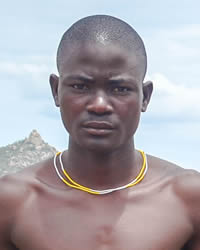Kuvale in Angola

Photo Source:
jbdodane - Flickr
Creative Commons
|
Send Joshua Project a map of this people group.
|
| People Name: | Kuvale |
| Country: | Angola |
| 10/40 Window: | No |
| Population: | 109,000 |
| World Population: | 109,000 |
| Primary Language: | Kuvale |
| Primary Religion: | Ethnic Religions |
| Christian Adherents: | 1.50 % |
| Evangelicals: | 1.10 % |
| Scripture: | Portions |
| Ministry Resources: | No |
| Jesus Film: | Yes |
| Audio Recordings: | Yes |
| People Cluster: | Bantu, Central-South |
| Affinity Bloc: | Sub-Saharan Peoples |
| Progress Level: |
|
Introduction / History
The Kuvale people speak the Kuvale language, a Southern Bantu language, which includes languages like Umbundu. Historically, the Kuvale have been semi-nomadic pastoralists, relying on cattle herding as their primary livelihood. They inhabit regions in southwestern Angola, particularly in areas like the Kamukuio cluster.
What Are Their Lives Like?
The Kuvale maintain a pastoral lifestyle, with cattle serving as a central aspect of their culture and economy. Their diet traditionally consists of milk, meat, and blood from their cattle, supplemented by honey and tree bark.
Traditionally, Kuvale communities live in manyattas (homesteads) constructed from local materials. These homesteads are organized around a central cattle enclosure and are often surrounded by thorn fences for protection. The roles within the community are typically divided along gender lines, with men overseeing cattle herding and women managing household duties and childcare.
In recent years, the Kuvale have faced challenges due to land disputes, conservation efforts, and the encroachment of agriculture and urban development. These factors have led to reduced grazing areas and have impacted their traditional way of life.
What Are Their Beliefs?
The Kuvale people practice African traditional religion, with a strong emphasis on ancestor worship and animism. They believe in spiritual forces residing in nature and ancestral spirits that influence daily life. Rituals and ceremonies are integral to their spiritual life, often involving offerings and prayers for rain, fertility, and protection.
While some Kuvale individuals have been exposed to Christianity, the majority continue to adhere to traditional beliefs. There is a significant need for culturally sensitive Christian outreach and discipleship among the Kuvale.
What Are Their Needs?
To effectively serve the Kuvale community, there is a need for deeper Christian discipleship that respects and addresses traditional beliefs, improved access to Scripture through localized translations and audio resources in the Kwavi dialect, and culturally sensitive ministry that resonates with their worldview.
Prayer Points
Pray that the Kuvale people may come to know a life-giving and transformative understanding of the gospel—one that honors their cultural identity and speaks deeply to their spiritual needs. Pray for God to raise up someone to produce culturally relevant gospel music for the Kwalis.
Intercede for the women and youth among them—that they may be empowered to rise as strong voices and faithful servants, both within their communities and in the life of the Church.